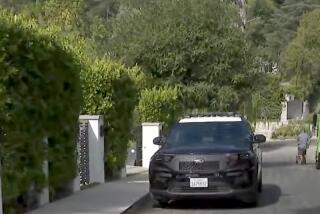Violent Crime Comes to Rural America, Catches Some Towns by Surprise : Trend: Small communities are no longer immune from big-city fears. Experts blame proliferation of drugs and lack of traditional values.
- Share via
ORANGEBURG, S.C. — Meredith Mathis never worried about her safety in this rural town where she grew up--until one evening last October.
Then, as Mathis shopped at the Pantry convenience store, three masked men robbed her. After she handed them her wallet, one man pulled a gun.
“I sat down on the floor and curled up in a ball,” she said. “I thought they were going to kill me, and I didn’t want to see them do it.”
This is the kind of thing Mathis might expect in bigger cities, like Columbia, where she works. But could it happen in this small town of about 14,000, where Russell Street still offers a bank and a shoe repair shop and a stationer and all the features of a Southern main street?
In Orangeburg?
“A decent person can’t even go anywhere without feeling threatened,” Mathis said.
In fact, law enforcement authorities and experts on rural life agree: The kind of crime that has vexed urban residents for so many years, crime in which strangers are victimized by strangers, has spread to small-town America.
“Rural areas are increasingly taking on the characteristics of urban areas,” said Joe Donnermeyer, director of the National Rural Crime Prevention Center at Ohio State University.
Much of the reason, authorities say, is the proliferation of drugs. Donnermeyer cited reports of drug-dealing gangs along the Mississippi River and in eastern Ohio, “where you wouldn’t expect anything on drug-related gangs.”
Interstate highways and better communications have brought drugs to rural areas, said John Bloch, director of the Washington, D.C.-based Rural Coalition.
“I don’t think there’s a division any longer between urban and rural,” Bloch said. “With cellular phones and other telecommunication devices, people are in touch with one another--for good and for evil.”
Nationally, rural crime has increased more than 500% during the last 25 years, according to the FBI. And of 31 South Carolina counties where more than half the people live in rural areas, 21 saw increases in violent crime from 1990 to 1991, according to the State Law Enforcement Division.
Orangeburg County almost seemed immune to that trend in 1991. Violent crimes declined from 1,207 in 1990 to 960 the next year. There were 13 murders in the county in 1990 and in 1991, just four more than in 1974, when state figures were first assembled.
But that immunity proved fleeting. In less than three months this year, the county has had eight homicides.
It used to be that murders and assaults usually occurred in bar brawls and domestic disputes, said Sheriff C. R. Smith Jr. But more and more, murderers and their victims are strangers whose paths cross with deadly consequences:
* In the last six months, two convenience store clerks have been killed.
* On Jan. 15, police Sgt. Thomas C. Harrison was shot to death at a department store as he investigated a bad check call. The body of a Columbia businessman was found the next day in the county. Two Alabama prison escapees have been charged with murder in connection with both killings.
* A junior high school student pleaded guilty to abducting a teacher at gunpoint from outside the high school and assaulting her.
* Earlier this month, a 14-year-old girl died of a head wound after she was shot in a local nightclub.
Orangeburg city Police Chief Maj. Joseph Keitt said small-town residents were blindsided. “Nobody expected it to happen here,” he said.
But Sheriff Smith did. “Law enforcement could have told you 10 years ago that it was coming,” he said. “But nobody listens to law enforcement.”
He blames “crack,” the rock form of cocaine, which he calls “the scourge of America.” Interstates 95 and 26 intersect in the county, and several colleges and a university make it attractive for drug dealers, he said.
Ohio State’s Donnermeyer said rural residents need not stand by and expect the worst. They should protect their property by buying good locks and forming neighborhood watches, he said. Exterior lights are helpful, and alarms can be as cheap as a $5 system that hangs from a doorknob, he said.
Communities also need programs to teach children positive values to counter the negative influences they see daily, Donnermeyer said. “Teen-agers watching television three hours a day will see 14,000 murders in one year,” he said.
Many who live in rural America agree that the way to solve the problem of crime in small towns is to return to the values that made them distinctive in the first place: to put stock in community, common sense and God.
“We must put God back in his proper place in man’s life. We have been created in the image and likeness of God and we have allowed that image to be be tarnished when we sit back and fail to tell our children God’s way is the only way, God’s way is the right way,” the Rev. Clarence Joyner of New Mount Zion Baptist Church told an anti-crime rally in Orangeburg this month.
Twelve hundred people turned out to hear the mayor, school officials, law enforcement authorities and others. They called for volunteers to help in the local schools, for more police officers and for a drug task force.
And most of all, they called for soul-searching.
“It’s time for Orangeburg to wake up,” said Angela Clark, Miss Orangeburg County. “For too long, children have equated success with what’s materialistic. We do not have the proper education to go into the future. We are lacking intellectually, emotionally, physically and most of all spiritually. It is time for us to come together and it is time for us to wake up.”
Mathis, the victim of the convenience store robbery, is putting her faith in something less lofty. After the mugging, she bought a gun. She also received the chemical repellent Mace as a Christmas present.
But Mathis knows that she can’t carry weapons everywhere she goes--and she doesn’t want to.
“I wish they could clean it up here,” she said.
More to Read
Sign up for Essential California
The most important California stories and recommendations in your inbox every morning.
You may occasionally receive promotional content from the Los Angeles Times.













